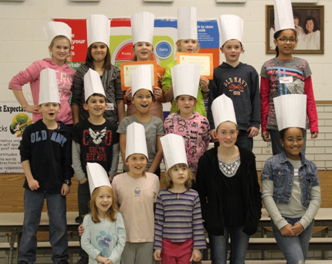Local Programs
The Family and Consumer Sciences (FCS) Program in Pulaski and Giles Counties serves as a resource to the community in the following areas:
Laura Reasor, Associate Extension Agent provides research-based educational opportunities through workshops, classes, collaborative projects, print materials, and other appropriate venues. All programs are driven by the community needs- identified by county residents, the Pulaski FCS Advisory Council and the local Extension Leadership Council.
Program Offerings:
- School Nutrition Series for Second and Third Graders in Pulaski County
- Money Management Classes
- Food Safety Trainings (ServSafe Manager and ServSafe Food Handler*)
- Parenting Programs
- Adult, Nutrition and Health Programs to Diminish Disease Risks
- Senior Nutrition Programs
- Youth Nutrition Programs
- Stress Management
*The ServSafe Food Handler Course covers the basics of food safety for anyone in food service. It is quick and affordable, but detailed and essential for working with food. This course is delivered upon request to the community. It is $20/person, covering materials, handouts, and administation fees. For more information, or to request a class, contact your local Extension office.

Pulaski County 4-H Youth Development programs are rich with learning experiences where young people partner with caring adults and volunteers in a fellowship unlike any other program available to youth today. Through 4-H, young people are encouraged to participate in a variety of activities that emphasize 4-H's "learning by doing" philosophy of youth development.
The 4-H Youth Development program in Pulaski County provides opportunities for youth, ages 5-18, to participate in dynamic and innovative, fun programs through which they can develop valuable, lifelong skills.
The Virginia 4-H Mission is to develop youth and those adults working with those youth to realize their full potential – becoming effective, contributing citizens through participation in research-based, informal, hands-on educational experiences.
4-Her’s in Pulaski County learn valuable skills, make new friends, solve problems, earn awards and recognition, practice citizenship, develop leadership abilities, and make a difference in their communities.
Pulaski County 4-H'ers participate in:
- In-School Clubs & Programs (3rd, 4th, 5th, 9-12th grade)
- After-School Clubs & Programs (currently 6th-8th grade) - Dublin Middle School
- Special Interest Clubs & Programs (ages 9-18)
- Project Clubs & Programs (ages 9-18)
- Community Clubs & Programs (ages 9-18)
- 4-H Cloverbud Club (PDF | 323KB) & Programs (ages 5-8)
- 4-H Cloverbud Camp (K – 3rd grade, ages 5-8)
- 4-H Home School Clubs (ages 5-18)
- (campers ages 9-13, Counselors In Training ages 13-14, teen counselors ages 14-18)
- 4-H Teen Weekends
- State 4-H Congress (ages 14-18)
- Virginia 4-H All-Stars
- 4-H Intermediate Congress (7th and 8th grade)
- 4-H Youth Contests at the New River Valley Fair
- Pulaski County 4-H Yearbook (PDF | 1MB)
4-H Pledge
“I pledge…
my Head to clearer thinking,
my Heart to greater loyalty,
my Hands to larger service,
and my Health to better living for my club,
my community, my country and my world.”
Standing for head, heart, hands, and health, 4-H uses more than a century of experience in youth development programming to build strong, confident leaders. Young people in the 4-H community learn leadership, citizenship, and a vast array of life skills that benefit them for the rest of their lives. Through school-based, after-school, and community clubs as well as camp settings, 4-H members pledge to build a better community, country, and world. 4-H’ers live by the 4-H Motto, “Making the Best Better.”
Upcoming Events
Pulaski County has a strong and active agricultural community with approximately: 445 farms and an agricultural market value over $28 million. Livestock sales make up 92% of this value while pasture and crops compose over 78% of all agricultural land. The average farm size is 217 acres. Much of this is derived from the marketing of feeder calves; however, breeding cattle, milk, lambs, wool, goats, hay, wheat, and corn are all revenue sources for farmers. Additionally, some local producers have developed a growing interest in agritourism, nursery stock, greenhouse tomatoes, and vineyards; which are expanding the variety of this area’s agricultural community.
What We Offer
The educational programs that Virginia Cooperative Extension offers to area agricultural producers vary with current needs. A small sampling of recent Extension programs that have been provided in Pulaski County include:
· NRV Field Day at Kentland Farm
· Cattle Management and Marketing
· Cattle Health and Nutrition
· Beef Quality Assurance Certification
· Forage & Crop Production
· Pasture and Weed Management
· Apple Tree Grafting
· Household Water Quality Workshops
· Private and Commercial Pesticide Applicator Certification and Recertification
· Pesticide and Container Recycling
· 4-H Livestock Club
Additionally, the Pulaski County office of Virginia Cooperative Extension provides the following services:
· Soil Testing/Forage Testing
· Insect & Weed Identification
· Plant disease Identification
· Manure Testing
Engaging with Communities
Virginia Cooperative Extension specialists in community viability work with Extension agents, campus-based faculty, organizational partners, communities, and individuals to further opportunity and build capacity in five program areas:
- Leadership & Planning
- Community Enterprise and Resiliency
- Community Food System and Enterprises
- Community Planning
- Emerging Community Issues
Examples of our work include training county elected officials, educating entrepreneurs, facilitating collaborative projects, supporting the growth of community food systems and local economies, enhancing agent skills and community capacity in facilitation and leadership, conducting problem-driven research, and creating publications and tools that address critical community needs.
Do you have a question about Community Viability?
Perhaps one of the Community Viability specialists below can help you. Contact a Community Viability specialist or direct a question to them using our Ask an Expert system.
Community Viability Specialists
See a list of our Community Viability Specialists


